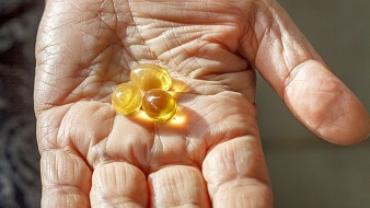
Vitamin D deficiency is a common health concern for postmenopausal women and has been associated with muscle weakness and an increased risk of falling.
The elderly population is more susceptible to a vitamin D deficiency due to poor dietary intake and nutrition-related conditions. Also they typically have decreased exposure to sunlight further increasing their risk for low vitamin D levels which in turn may lead to more falls.
A new study published this month demonstrated that vitamin D supplementation can significantly increase muscle strength and reduce the loss of muscle mass in postmenopausal women. This double-blind placebo-controlled study was conducted over a nine month period. Muscle mass was estimated by total-body DXA as well as by other functional tests such as handgrip strength and through a chair-rising test.
The results demonstrated that the women who received the vitamin D supplement had a significant increase (+25.3%) in muscle strength whereas those who received the placebo lost an average of 6.8% of muscle mass. In addition women who did not receive the vitamin D were twice as likely to fall.
Researchers concluded that vitamin D supplementation alone provided significant protection against sarcopenia with significant increases in muscle strength and control of progressive loss of lean mass.
There is an ongoing debate regarding the benefits of vitamin D and calcium on improving bone health and preventing fractures. This study provides further evidence to support the use of vitamin D supplements by postmenopausal women in an effort to reduce the risk of falling and provide health benefits. There was also a previous study published two months ago in the Journal of the American Geriatrics Society which reported that vitamin D supplementation was effective in increasing vitamin D concentrations and reducing the risk of falling. With that being said we have to remember that vitamin D is important but not the only key player. It is also still beneficial to assess calcium magnesium vitamin K and other trace minerals for deficiencies and support accordingly. This can be easily done as there are several labs that can assess RBC minerals and fat-soluble vitamins. In addition a bone resorption assay may be considered.
By Michael Jurgelewicz DC DACBN DCBCN